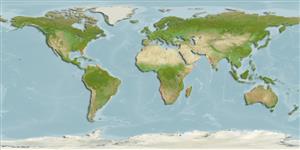Actinopterygii (ray-finned fishes) >
Siluriformes (Catfish) >
Ariidae (Sea catfishes) > Galeichthyinae
Etymology: Galeichthys: Greek, galeos = a shark + Greek, ichthys = fish (Ref. 45335). More on author: Valenciennes.
Environment / Climate / Range
Ecology
Marine; brackish; demersal; amphidromous (Ref. 51243); depth range ? - 120 m (Ref. 27121). Subtropical, preferred 23°C (Ref. 107945); 17°S - 11°S, 14°E - 33°E
Southeast Atlantic: Walvis Bay, Namibia to the vicinity of East london, South Africa (Ref. 85159). Records from Guinea-Bissau as Tachysurus feliceps and from Guinea as Arius feliceps are erroneous.
Length at first maturity / Size / Weight / Age
Maturity: Lm ?, range 25 - 27.5 cm
Max length : 55.0 cm TL male/unsexed; (Ref. 3976); common length : 35.0 cm TL male/unsexed; (Ref. 3546)
Vertebrae: 51 - 52. This species is distinguished by the following characters: head longer than, or nearly as long as, broad; tooth patches are posterior to premaxillary band touch at midline; relatively long and thin maxillary barbel, extending at least to pectoral fin spine origin (longer in females); dorsal fin spine length more than 70% of its height; pectoral-fin spine at vertical extends at most to hind edge of dorsal fin base; deeply forked caudal fin with moderately slender, with pointed lobes, upper lobe longer; caudal peduncle approximately twice as long as deep; 11-14 gill-rakers on anterior face of first arch; upper two-thirds of body darkened, some lateral speckling and belly stark white; median anterior cranial fontanelle (of exposed skull) elongate and bullet-shaped; smooth and shallow median cranial depression, deepest posteriorly at frontal/supraoccipital suture. 10-12 pectoral fin rays; 51-52 (17 precaudal, 34-35 caudal) total vertebrae. Dimorphism of posterior (humeral) process of cleithrum obvious externally, in females, fan-shaped, in males triangular (Ref. 85159).
Generally found in large shoals on muddy bottoms in turbid waters, usually on the coastline and estuaries. Also found in rivers (Ref. 3976). Feed on crayfish, small fish, and crabs (Ref. 27121). Considered a nuisance of shore and ski-boat anglers in southern Africa as little else is caught (Ref. 12484). Spines are poisonous and wounds should be treated immediately. Marketed smoked (Ref. 36731).
Life cycle and mating behavior
Maturity | Reproduction | Spawning | Eggs | Fecundity | Larvae
A paternal mouthbrooder.
Kulongowski, C., 2010. Revision of the ariid catfish genus Galeichthys Valenciennes (subfamily Galeichthyinae), with description of a new species from South Africa and designation of a neotype for G. ater Castelnau. Smithiania Bull. (12):9-23. (Ref. 85159)
IUCN Red List Status (Ref. 115185)
CITES (Ref. 94142)
Not Evaluated
Human uses
Fisheries: commercial; aquarium: public aquariums
More information
ReferencesAquacultureAquaculture profileStrainsGeneticsAllele frequenciesHeritabilityDiseasesProcessingMass conversion
Tools
Special reports
Download XML
Internet sources
Estimates of some properties based on models
Phylogenetic diversity index (Ref.
82805): PD
50 = 0.5625 [Uniqueness, from 0.5 = low to 2.0 = high].
Bayesian length-weight: a=0.00977 (0.00381 - 0.02510), b=3.03 (2.81 - 3.25), in cm Total Length, based on LWR estimates for this (Sub)family-body shape (Ref.
93245).
Trophic Level (Ref.
69278): 3.8 ±0.2 se; Based on diet studies.
Resilience (Ref.
69278): Medium, minimum population doubling time 1.4 - 4.4 years (Assuming tm=2-3).
Vulnerability (Ref.
59153): Moderate to high vulnerability (52 of 100) .
